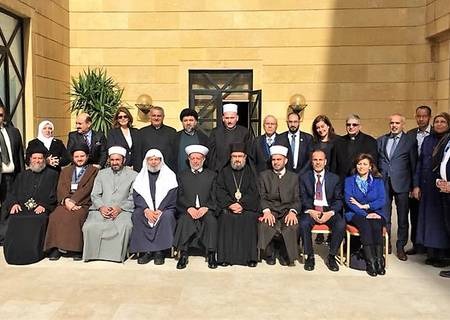Religious leaders from the KAICIID-supported Interreligious Platform for Dialogue and Cooperation in the Arab Region (IPDC) as well as several KAICIID Fellows have issued a series of statements highlighting the role of religious leaders and institutions in response to COVID-19. The articles tackle topics such as the social impact of the pandemic, how to reduce its spread, as well as outline subsequent humanitarian responsibilities arising from the disease.
The IPDC, which is the first interreligious platform to advocate for the rights and inclusion of all communities in the Arab World, brings together some of the most senior Muslim and Christian leaders in the region to address community challenges.
In the first days of the pandemic, platform leaders called for multi-religious cooperation in the Arab world based on the “values of collaboration, brotherhood, and solidarity in their societies, stressing the importance of rising above any disagreements and standing shoulder to shoulder regardless of different religious, cultural and ethnic affiliations, in order to overcome this critical period.”
Following their initial call, through eleven articles, IPDC members and Fellows from the Arab Region provided different perspectives and recommendations for how to effectively deal with the global pandemic. Their editorial pieces further emphasise the idea of human solidarity and the crucial role that religious leaders and institutions play.
Below, we share excerpts of their recommendations, as part of KAICIID’s online campaign #ReligionsRespond.
“It is critical that wise leaders of different religions and sects in all communities highlight the importance of supporting local, regional and international decisions and measures aimed at limiting the spread of COVID-19. In light of the trust and respect granted to them, they should also encourage their followers to adhere to all guidelines and advice issued by the medical and administrative authorities in their countries, while also promoting human solidarity by helping the needy.”
– Masroor Aswad, Member of the Iraqi High Commission for Human Rights, Iraq
“For religious leaders to successfully manage this crisis, they should above all break the old distorted image which depicts them as a theological body racing to provide religious interpretations of pandemics which are only related to divine punishment and torture, instead of using religious texts in order to address collective consciousness (Mind of Community) and rationalise people’s emotions.”
– Fairouz Bibi, KAICIID Fellow, Algeria
“The most important message that religious leaders should deliver to the world in the midst of the COVID-19 pandemic is a message from religion which is full of wisdom and philosophy, reminding us that the source of humanity is one and their destiny is one.”
– Dr. Mostafa Boujemaa, Professor of Comparative Religions, Abdelmalek Al Saadi University, Morocco
“In the future, we should have an established network for religious leaders to address global disasters that meets when a humanitarian crisis breaks out. They could coordinate with each other, develop urgent solutions and strategies and direct their followers on proper religious guidelines and teachings in line with each crisis.”
– Hani Dawah, Deputy Media Adviser to the Mufti of Egypt, Member of the Executive Committee of the IPDC, Egypt
“No religion is willing to witness the collapse of its community and become a victim of a deadly virus that does not distinguish between individuals, no matter the religion.”
– Kheder Dumaley, Researcher in Religious Issues, Minorities and Peacebuilding, Member of the Center for Peace Studies and Conflict Resolution, University of Duhok, Iraq
“Religious leaders should emphatically reject and categorically refuse the association or explanation of the pandemic or the causes thereof, which have religious grounds, such as punishment meted out by Allah for irreligious or non-religious people or as a trial or ordeal by Allah as the acid test for all believers.”
– Dr. Mohammed Abd El-Fadeel, Al-Azhar University, KAICIID Fellow, Egypt
“This pandemic reminds us that we are all in the same boat and that we are all, without exception, God’s creation. We address our prayers to Him and ask Him to save us from harm. Our true belief in God, the Creator of Heaven and Earth, is common to all religions. We are all sisters and brothers in humanity and this plight touches us all with no discrimination of gender, race or religion.”
– Dr. Elias M. Halabi, Associate Director of Sheikh Nahyan Centre for Arabic Studies and Intercultural Dialogue, University of Balaman, Lebanon
“It is essential to create permanent administrative committees at the level of religious institutions, which are concerned with crisis management, and can comprehensively coordinate with civil society organizations, institutions and individuals, as well as among themselves.”
– Yassin Noui, Researcher in Comparative Religions, Prince Abdulkadir University, KAICIID Fellow and Youth Platform Member, Algeria
“All religions teach us to have a comprehensive look at challenging situations: the positive, the negative and then the conclusion behind it. Healthy thinking means looking at life and the world in a balanced way, not through rose-colored glasses.”
– Heba Salah, KAICIID Fellow, Egypt
”The concerted efforts and networking between religious leaders within one community and its denominations has become an axiom, and networking has become equally important between religious leaders, NGOs and the local community in various fields and activities.”
– Father Nemah Saliba, KAICIID Fellow, Researcher and Trainer in Christian-Islamic Relations, Lebanon
“The commitment of various religious institutions to their social responsibility during the current crisis is displayed through a set of practices such as sending clear messages of peace, reassurance and safety.”
– Ramy Atta Seddik, Researcher, Journalist and KAICIID Fellow, Egypt.
“The role of religious leaders in creating strong, unified prophetic speech that advocates the plight of the vulnerable should be a number-one priority. Additionally they should direct wealthy individuals in all countries to donate to the health sector in order to shore it up, as a sacred religious duty.”
– Bishop Elias Toumeh, Antioch Orthodox Church, Syria
Source: www.kaiciid.org






